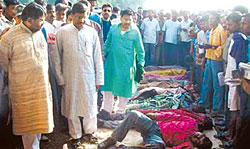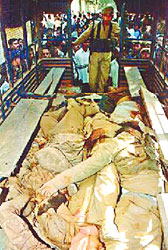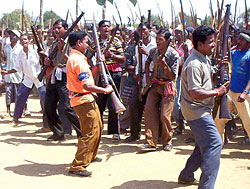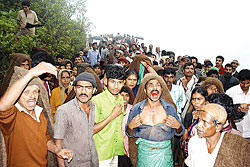|
|
| BANDOBAST: The Armed Police Force guards an intersection in Birganj on Monday night after security was stepped up in the tarai. |
Maoist rebellions are raging in a red crescent stretching across India's most deprived but resource-rich states, providing Prime Minister Manmohan Singh with what he has called his country's "gravest internal security challenge".
The strength of the Naxalites increased after the Communist Party of India (Maoist) was formed in 2004 when two powerful far-left groups merged. The Naxalites seem to have no shortage of recruits, mainly because India's blistering economic growth has not percolated through to a large section of rural India.
Some policies have aggravated the distress: the state\'s withdrawal from basic services, the agrarian crisis, displacement for special economic zones. The judicial system is in a mess, with a backlog of cases in local courts. Inequitable land policies, unemployment, and the exclusion of tribals by forest contractors provide ready fodder for the Naxalites.
Some in the government exaggerate the threat since it gives them a pretext to repress and divert attention from non-performance. Others downplay the threat. The government admits the issue has a socio-economic dimension, but in practice treats it as a law and order issue.
There have been harsh crackdowns by police in some states, but analysts say such a strategy only has limited benefits. The Naxalites also need to examine why they have chosen the gun and whether they have any chance of extending control militarily.
Instead, their 'revolution' stifles the democratic space by giving the state a reason to repress not only the Naxalites, but all other dissenters. As in Nepal, it is the poorest who suffer. The excessive Naxalite reliance on arms, with little attention to mass mobilisation, has raised a trigger-happy cadre using the ideology as cover for personal benefit.
There is no one Maoist movement in India, there are many kinds of Naxalites. Resolution of the conflict needs to recognise this heterogeneity and examine the dynamics in different states.
Red Crescent
Naxalites vs Maoists in Bihar
|
|
Ram Jatan Sharma of the Communist Party of India (Marxist-Leninist, Liberation), also called Male sits in his office near the Income Tax crossing in Patna. The neighbouring office happens to be that of the BJP, Male's arch rival which is also in the Bihar legislative assembly.
"The Maoists are repeating our mistake, we have to accept that people participate in this system, mainstream parties have support, and a revolutionary situation does not exist," Sharma told Nepali Times. Male suffers because of its former closeness to the Maoists, but the Maoists accuse them of betraying the revolution. Bihar's Maoists have continued with armed action, engaging in brutal clashes with upper caste private militias. They engineered a daring jail break in Jehanabad and an attack on Madhuban in recent years and have expanded to districts bordering Nepal.
With the state either weak or oppressive, Maoist influence will probably remain. But it is unlikely that their activities will grow to such an extent that it will radically alter the politics of the state.
Anarchy in Jharkhand
|
|
Jharkhand is where these layers intersect. The Maoist movement here is shorn of its idealism, and has descended into criminalisation and corruption. A CPI (Maoist) member in Ranchi admits: "There is lack of politicisation of the cadre and people join because they are attracted by the gun." Maoists here are often called 'Money Collection Centre', a reference to their levies on contractors, shop keepers, government officials, industries, and development programs. Differences over sharing the loot, and caste tensions between Yadavs and Dalits, have also led to the formation of splinter groups.
But the picture is not black and white. There is an intriguing connection between mainstream politicians and Maoists. Local leaders require Naxalite support to win polls in areas under their influence and give money in return. And the Maoists are happy to get protection from these leaders in case they get caught and assure them of security.
At the government level, there is no plan to deal with the rebels. A police official in Hazaribagh district told Nepali Times: "We are only temporary barriers. Dealing with the Maoists requires a more concerted strategy from the top, which is absent." New mining contracts by the government have lead to mass displacement and helped rebel recruitment. Land reforms, job creation and provision of justice are completely absent in Jharkhand.
In Chatra on the Bihar-Jharkhand border, the fear is palpable as the sun sets. A shopkeeper says ominously: "This will only increase sir. Just wait for the explosion of violence."
Andhra setback
|
|
This not just hyperbole. Andhra's Maoists are affected by reduced recruitment, a weakening of their strike power, the killing of key leaders, and the absence of mass mobilisation. The Grey Hyenas, a special force which lives in the forests like the Maoists, have targeted and killed rebel activists. The state used the 2004 ceasefire to build a strong network of informers, infiltrate the movement and track Naxalites closely. It is using this advantage now, while trying to be careful not to violate human rights.
The presence of Andhra Maoists in the Telangana region is also weakened by the second generation not being interested in rebellion. "The success of the Maoists is now limiting their growth," G S Rao, a journalist in Warangal, told Nepali Times. "They have broken the feudal structure here. People have benefited from aspects of the rebellion but have also seen the pain that comes with it. And the young would like to move on and make the most of available opportunities." Universities, which were traditionally sites of Naxalite recruitment, now have big boards advertising placements in IT companies.
The Maoists, however, continue to command respect and sympathy of a large section of Telegu society. As a Muslim auto driver in Hyderabad put it: "They speak for the poor and attack the chor netas. Maoist politics should be there but there should be no killing."
The Chhattisgarh war
|
|
The Maoists gained popularity in the region by fighting against exploitative forest contractors and living with the tribals. In 2005, resentment among tribals against Maoists grew because of their coercive actions, interference with local customs, and a ban on tendu-leaf collection, a source of livelihood. The government capitalised on this and prodded tribals to translate their anger into anti-Maoist militancy. When the Maoists retaliated, the state decided on the Vietnam-style hamleting strategy. But it used intimidation to force people out of their homes.
The tribals are now caught in a trap. Those still in the forests are seen as terrorists by the government, those in camps are perceived as government supporters by the Maoists. Both sides launch attacks and the tribals get killed even though all that they would like is to be left alone. If the government's original aim was to dry out support for the Maoists in their strongholds and lock people in with the state, it is not working.
"The state outsourced its responsibility, instead of fighting the Naxals," says a Dantewada journalist, as trucks of paramilitary forces move along the road. Even as it devastates the lives of tribals, Salwa Judum has benefited many. Local politicians and officials are siphoning off funds, the ruling BJP government is Hinduising the tribals in camps, and mining industries are moving into the vacated land.
There has been an escalation of violence, rationalised in the capital Raipur by a police official. "There will obviously be deaths. This is a war." A war in which the poorest Indians are dying every day.







